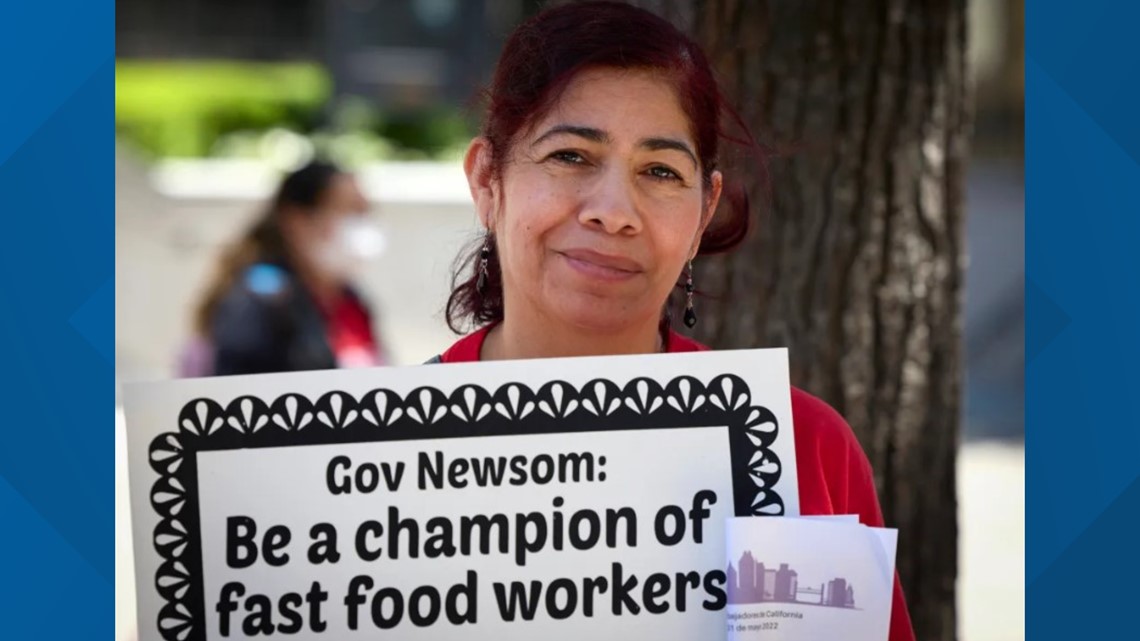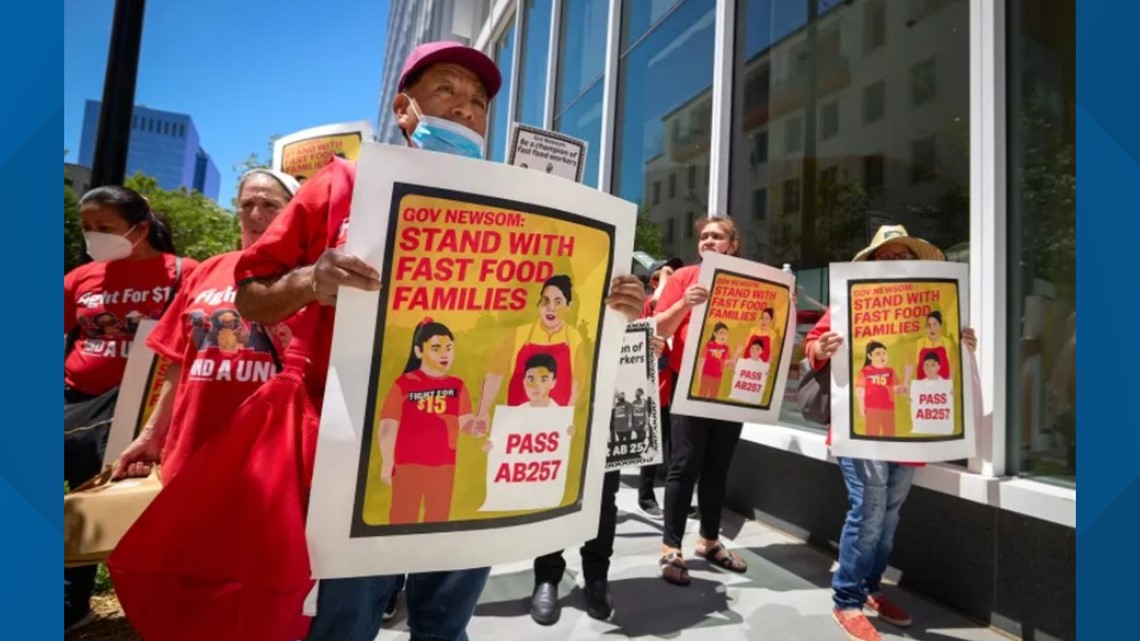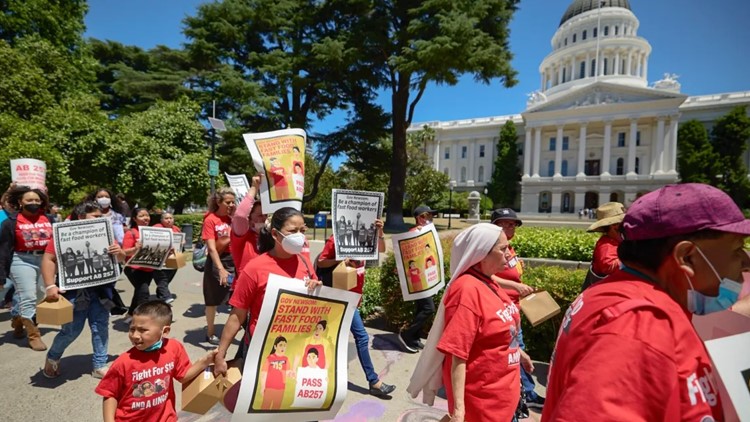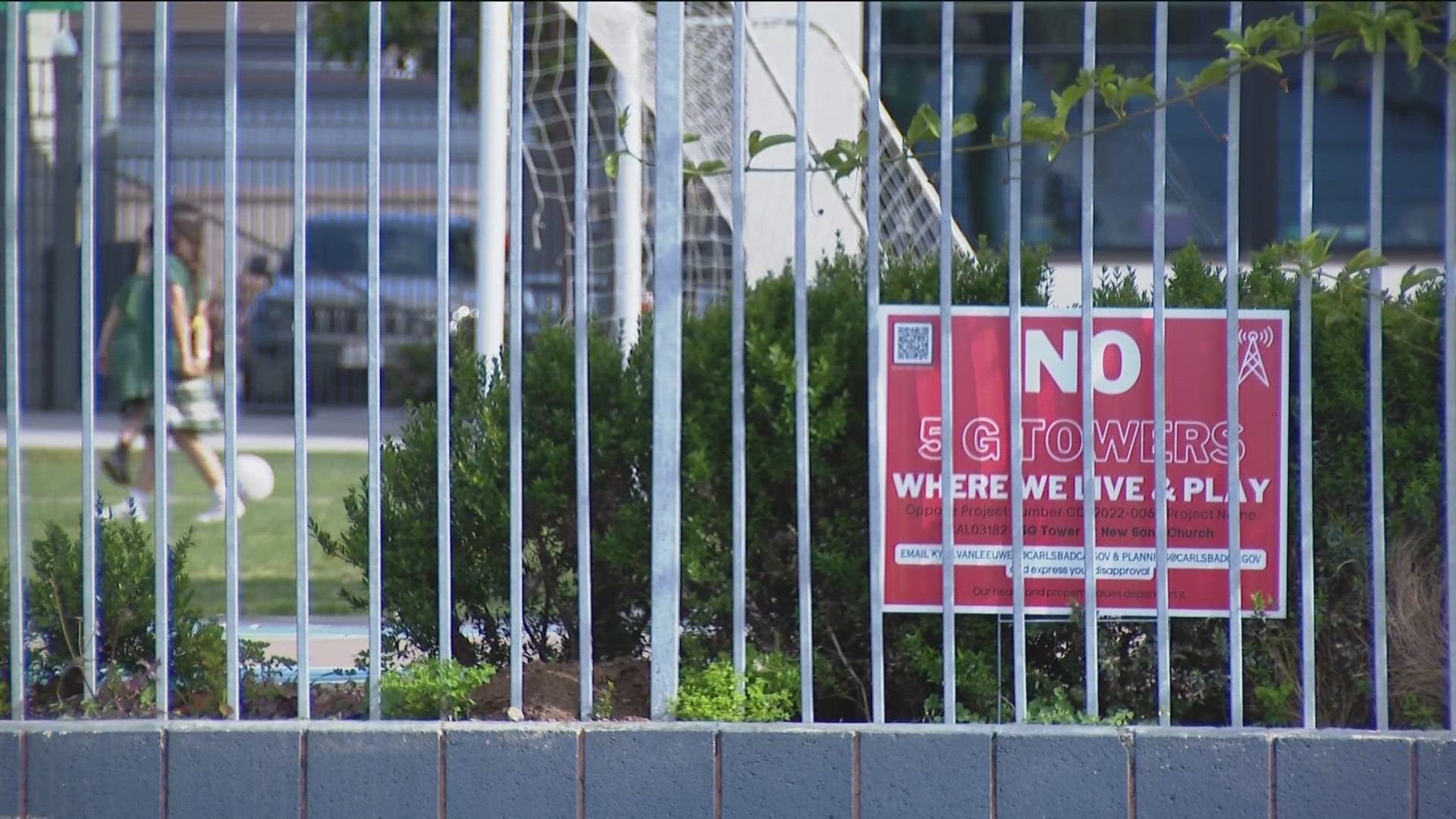This story was originally published by CalMatters.
For three days in April, a striking group of Jack in the Box cashiers and cooks shut down their Sacramento County store. They were calling for better schedules, more staff and for management to repair a broken ice maker.
They also called for a transformation of their industry.
Donning red T-shirts from the decade-old “Fight for $15” minimum wage campaign, the workers chanted for the passage of Assembly Bill 257.
AB 257 threatens to upend the fast food franchise business model in California. It would create a state-run council to negotiate wages, hours and working conditions for an industry that, according to federal data, employs more than 700,000 people in the state.
Under the bill, employers would be responsible for the regulations, but so would the fast food corporations that partner with franchise owners.
The measure is set to be heard in a state Senate committee next week, when organizers plan a series of coordinated strikes at fast food shops in San Diego, Los Angeles, Oakland and Sacramento.
“AB 257 will force them to change — will hold them accountable,” said Adonida Briseño, 26, a Jack in the Box worker who took part in the April strike.
A potential foothold
The Service Employees International Union’s push to pass AB 257 is one of the most significant organizing efforts in its “Fight for $15” campaign, a chance for a foothold into a low-wage industry where unionization has long been elusive.
California has been a proving ground for the union’s efforts to advocate for low-wage workers. Los Angeles adopted a $15 minimum wage in 2015 and the state followed suit in 2016.
But franchisors and franchisees say AB 257 is unnecessary and burdensome and would raise prices for working-class customers.
“Inflation is top of mind for everybody,” said Jeff Hanscom, spokesman of the International Franchise Association, which represents corporations and franchisees. “It just doesn’t make sense.”
Gene Erdman, who works at a company that owns 235 Pizza Hut franchise locations in southern California, said the council would increase costs and squeeze businesses.
“It’s not the relationship with the franchisor,” said Erdman. “What makes it hard to make money is what we’re dealing with from a regulation standpoint in California.”
After narrowly passing the state Assembly in January, the bill is set to receive its first Senate hearing June 8.
Solution or overkill
Sen. Dave Cortese, a San Jose Democrat who chairs the Senate committee hearing the bill, said he supports rooting out wage theft, one of the bill’s aims, but he worries that the bill’s creation of a broad, regulation-setting body would be like “using a meat cleaver instead of a scalpel” on the problem.
“We just have to be careful about regimenting wages from an independent council,” he said. “In tough times, you have to be able to make course corrections.”
Sen. Josh Newman, a Brea Democrat who is on the fence, said it would be “no small thing to create a new body to oversee a whole industry.”
While the pandemic decimated indoor dining, large corporate restaurant chains fared better than neighborhood, locally-owned locales because of their size and cash holdings. Fast food restaurants, in particular, had more experience with drive-throughs, carryout and delivery options.
California has the most fast food workers in the country. In April more than 725,000 workers were employed in California’s limited-service food industry, which includes fast food workers as well as those who work in fast casual establishments, pizzerias and cafes. That’s higher than before the pandemic and 11% more than the same month last year.
Fast food counter workers in California made $15.61 an hour and cooks $15.35 on average, according to federal data from last May.
Few fast food stores have unionized. Organizers blame that on high employee turnover and the thousands of individual franchise owners they’d have to bargain with.
Drop in a bucket
There has been a trickle of successful Starbucks union elections this year, but those stores are owned by one corporate employer rather than franchisees. They represent a “drop in the bucket” of fast food locations, said Nelson Lichtenstein, a labor historian at the University of California, Santa Barbara.


Leticia Reyes, 55, a cook at the Sacramento County Jack in the Box, said workers like her aren’t benefiting from the industry’s growth. She worked through the pandemic, despite her fears about getting sick, because her husband was laid off from his hotel chef job.
“They’re making millions and millions of dollars off of us, the workers,” Reyes said. “And we aren’t very safe.”
The restaurant frequently was busy and understaffed and the drive-through was packed.
One day last June, the air conditioner was broken and temperatures soared to 109 degrees, according to a complaint Reyes and six other employees filed with California’s Division of Occupational Safety and Health.
“The manager told us that it wasn’t hot, we were going through menopause,” Reyes said. “We had to bring fans from our homes to withstand the heat.”
Worker complaints
The workers went on strike for one day, prompting the manager to fix the air conditioning, Reyes said.
A few days later, on Aug. 3, the workers filed a wage theft complaint with the state labor commissioner, alleging owner Anil Yadav had been cheating workers out of pay and denying them breaks, including during 16-hour shifts.
Yadav did not return phone calls seeking comment. An attorney for Yadav, Kevin Kevorkian, declined to comment.
Workers went on strike again in April, after filing a second CalOSHA complaint citing moldy machines, a hole in the ceiling that let rain in and faulty drive-thru speakers that they said led to a customer pulling a gun on a cashier.
That complaint also said workers, including a pregnant employee, had to climb onto a table to scoop ice for customers from a broken dispenser. Copies of both CalOSHA complaints and the wage theft complaint were provided to CalMatters by SEIU.
Fast food workers in California have gone on strike 2,560 times since the start of the pandemic, the SEIU said. The union also has helped workers file more than 330 health, workplace and wage complaints in California.
CalOSHA issued 38 COVID-related violations at fast food establishments, affecting a tiny fraction of the industry, the California Restaurant Association pointed out.
California has some of the nation’s strictest worker protection laws, the association contends, so the state should instead fund its backlogged wage theft and workplace violation investigators.
The franchise system
“We believe the system is set up to be robust and protective,” said Matt Sutton, an association spokesperson. “There’s a pathway for people, and they use it all the time.”
But franchise systems leave business owners with little room for overhead, leading them to cut corners and pay low wages, critics say.
“The corporations — the McDonalds, the Jack in the Boxes, the Burger Kings — by design have created this system as a means to diminish the power of working people,” said David Huerta, president of the California SEIU State Council. “We’re trying to untangle that and create an environment where workers have a direct voice with their employers.”
Fast food corporations have long rejected legal responsibility for how franchisees treat workers. Under former President Donald Trump, the Department of Labor curbed instances in which corporations counted as a “joint employer” of restaurant workers, though under President Joe Biden the same agency rolled back that regulation.
The SEIU and its allies in the state Legislature want California to establish joint responsibility, holding franchisors liable for labor law violations at their franchisees’ locations.
That has the restaurant association and fast food store owners worried that corporate franchisors will pull back opportunities in a field they say has lower barriers for entry small and minority business owners than other enterprises.
A joint council
The bill would create an 11-member council composed of business, labor and state representatives. It would set across-the-board standards for fast food chains with 30 or more locations, franchised or not.
“This is blanket legislation for the entire state,” said Harshraj Ghai, whose company, Ghai Management Services, is one of the state’s largest franchise owners with about 200 Burger Kings, Taco Bells and Popeyes stores employing more than 4,000. “The rules are going to be made for markets like Fresno and San Francisco — all the same.”
Ghai said his father started working in Burger Kings when his family immigrated from India in the 1990s and operated his first franchise in 1999.
He fears a statewide council’s rules would raise costs when inflation already is squeezing his profit margins. Most of his locations are in California.
“It’s going to make it very difficult for us to keep staffing our restaurants,” he said.
One of his Sacramento-area Burger King locations was the site of a rally for AB 257 in May. There workers complained of a broken AC. He said the equipment has been replaced and the store this week passed a CalOSHA inspection after employees filed a complaint. That labor enforcement system, he said, is the right way to resolve worker complaints.
Sectoral bargaining
Similar to the fast food push, nursing home workers, who also are supported by SEIU, have asked state lawmakers to create a board overseeing their industry.
This so-called “sectoral bargaining” approach is common in Europe, including Austria and France. It allows workers to bargain with employers across an industry rather than at each shop or business.
While some local and state governments in the U.S. have enacted industry-specific boards to dictate working conditions, SEIU’s fast food council push is more ambitious, said David Madland, a senior fellow at the Center for American Progress.
“You have the potential to transform the industry from a really low-wage sector — with little ability to change — to become a model for other sectors,” Madland said.


Even so, the idea isn’t new for California. For most of the 20th century, the state issued industry-specific wage orders through the governor-appointed Industrial Welfare Commission to cover marginalized workers.
In sectors as wide-ranging as film, canning, and sheep-herding the commission set standards such as the lengths of breaks, the provision of uniforms and the temperature of workplaces. It even had the power to dictate the state minimum wage.
Today 17 industries still operate under its orders though the board itself is gone. It was defunded in 2004 at labor’s urging after years of political controversy, including loosened regulations.
As for the Sacramento County Jack in the Box, Reyes says the strikes have produced some results. Managers have fixed the broken ice machine and the air conditioning unit. And they have paid her some of the wages she said they owed her.
But forming a union to ensure long-term change is impossible at her store, Reyes said, because many workers are scared and that’s why the statewide bill is necessary.
This article is part of the California Divide project, a collaboration among newsrooms examining income inequality and economic survival in California.
CALmatters.org is a nonprofit, nonpartisan media venture explaining California policies and politics.



